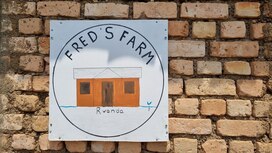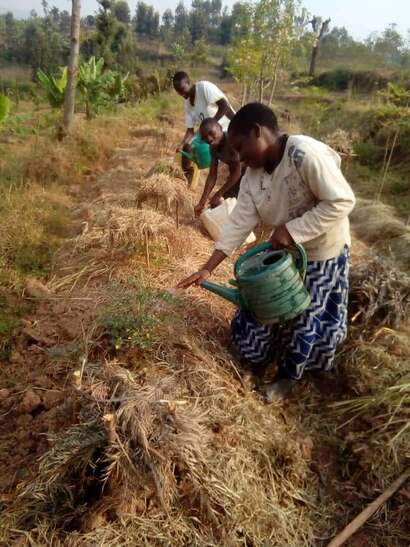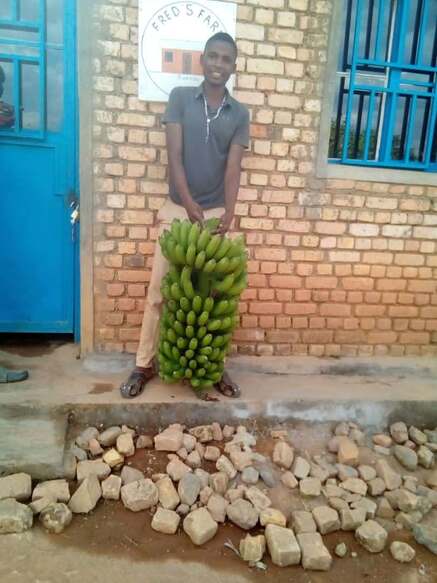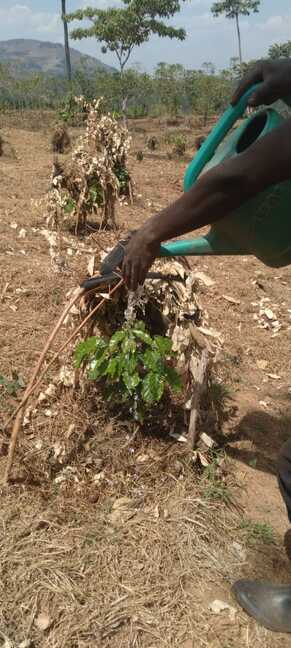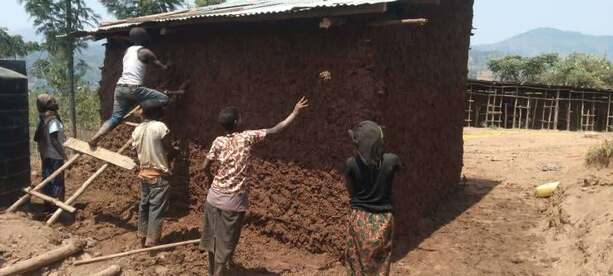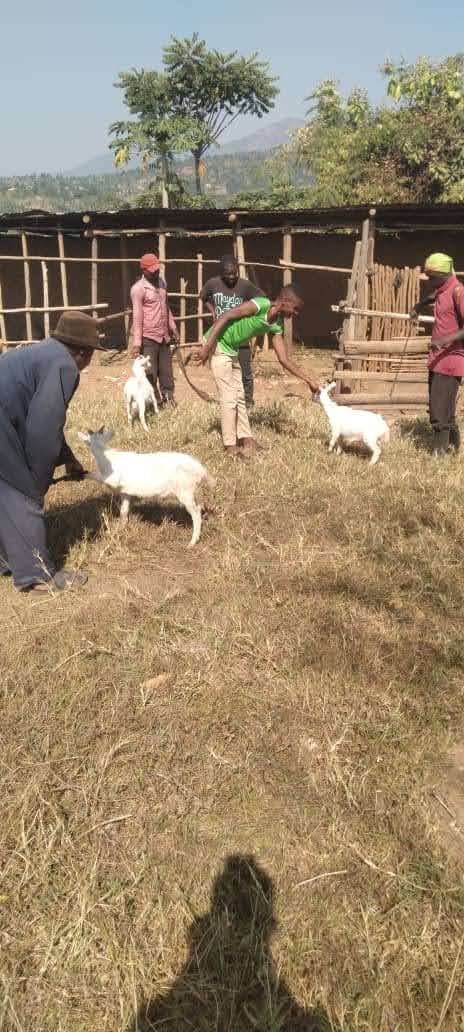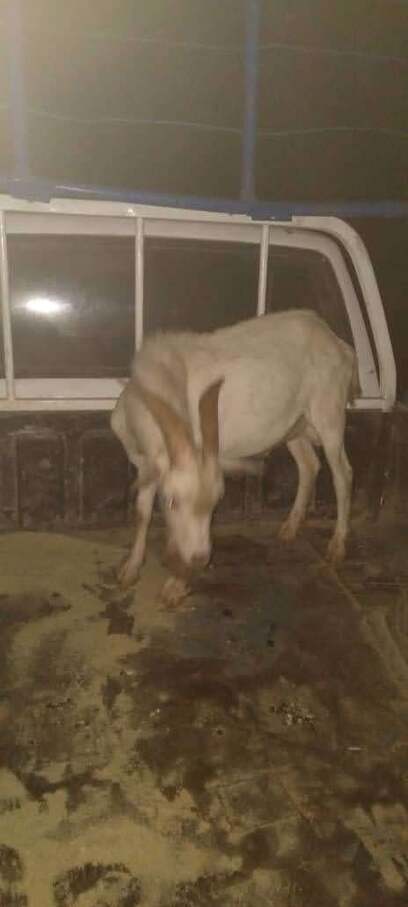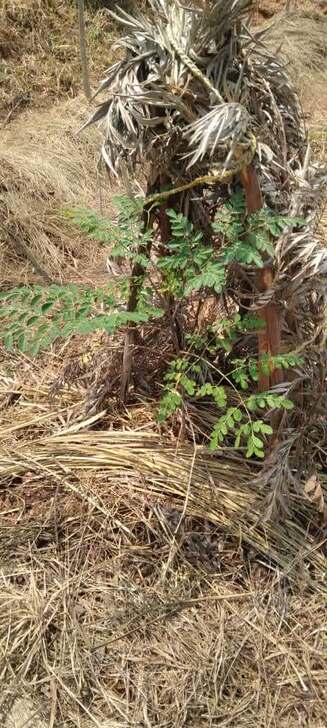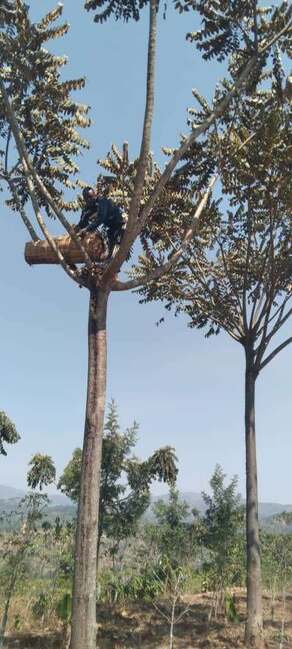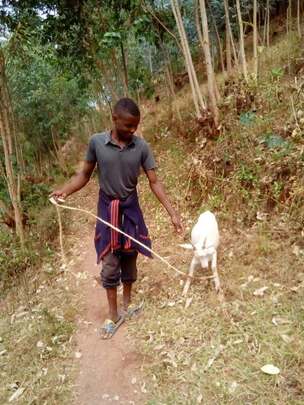|
DRY, DRY and now rain The dry season is a time for less activity on the farm. Three months without rain means no growth, so we normally reduce the number of staff who are employed on a daily or weekly basis. No rain is always a challenge for seedlings and young plants but this dry season was an extra challenge as our water supply was "cut" for several weeks. So once our water tanks, total capacity 9000 litres, were emptied, the water for all the young plants had to be fetched in the river a few kilometers from the farm. Hence we had to employ more rather than less people to try to save these plants, and worked hard to provide more shade for these young vulnerable plants ( see picture below). But 07. September the heavens opened! Torrential rain. Jacques was stranded at his home and tried to prevent flooding in his house, whilst on the farm, trenches were dug to redirect the rain water away from the goat shed and the henhouse. The dry season is drier and the rainy seasons more dramatic. THE FARM Food supply for the staff In the midday rest period, the staff light a fire and prepare some food. Peanuts, beans and eggplant were harvested at the start of the dry season. Banana and papaya grow and ripen throughout the year and give a more steady supply of fresh food. We work towards establishing a "food forest", food grown on trees which, once established, provide food for years (see picture below) . Coffee As we described in the last newsletter we are testing different ways to provide groundcover around the coffee bushes. The idea is to work less in the ground, which is positive for soil quality, the climate and will also hopefully help us to use less manpower growing coffee. The coffee seedlings planted in February have been carefully tended with lots of shade and sufficient water, and most have survived and are very healthy. (See picture below) Maintenance The dry season is a good period to do necessary maintenance on the farm. The storage shed/henhouse had to be demolished and rebuilt as termites had destroyed the structure (see picture below). Improving trenches to channel rainwater, is also an ongoing process. THE COMPENTENCY CENTRE On FRED'S FARM we test different farming ideas, then offer the knowledge and practical know-how to local farmers. Dairy goats The young bucks are now mature, and must leave the farm to prevent interbreeding and do their job to breed with local goats to hopefully make them produce more milk. These young bucks have now new homes with Innocent (the village leader), Vincent (a trustworthy, established local farmer), Elie and Michel (both former interns on FRED'S FARM). The young bucks now provide a free breeding service for local goats. Elie is now employed to help follow up this breeding service. Our "old" buck died in February after eating poisonous leaves. At the beginning of August, Jacques made the long truck journey to the Eastern Province to buy a new buck. This is a looong drive. On the return journey smoke and flames came out from the engine. The driver managed to extinguish the fire and repair the damage. They arrived back at the farm at 1 am. As the buck was being taken to his new home, he broke away. The village leader summoned all the villagers to search and catch the goat. Thanks to the community effort, at 6 am, the newly named COMEDY GOAT, relaxed in his new pen! Moringa Pascasie and the interns, Donate, Marie and Emmanuel,have tenderly cared for all the moringa seedlings, and now these seedlings are healthy young trees! We are very proud of the work they have done (see picture below). TWA Twa Children to School The school holidays are drawing to a close, and our farm manager, Providence, is working hard to motivate parents in the Twa village to prioritise sending their children to school. As yet we don't know how many children we will be supporting this coming school year. But our intention is to continue supporting those who have attended, and hopefully more! Food at school Through the dry season, Pascasie, our moringa specialist, has followed up the vulnerable moringa seedlings which are planted at the school. Internship on the farm The internship program has proven to be an asset for the students themselves, the local community and FRED'S FARM. The small income the students receive provides immediate support for the family, the savings sum the students receive at the end of their internship provides the possibility for investment in an animal or trees, and knowledge gained can be shared. Pascasie and Elie, 2 former students have now permanent employment on FF, and Felix constructed and installed 4 new beehives on the farm. These beehives will be home to pollinator wild bees. They are also works of art! Personal story Elie Mutabazi is the new night watchman at FRED'S FARM, and also has a small position to follow up the dairy goat interbreeding program in the community. Elie is 20 years old, and lives with his mother Daphanie, father Frederick, 2 brothers and 2 sisters in Kinyana village, not far from the farm. After the holidays, he will start at his last senior high school year. Elie's dream is to be a big agricultural and animal farmer. During the internship programme at FRED'S FARM, Elie was highly motivated and interested, and told us how he saved both in the village and the school savings programmes. Elie now tells us how FRED'S FARM internship program helped him realise his dreams; he has bought a female pig and 2 hens. The pig has produced 6 piglets which he has sold. The cash from this sale put him in the position to buy a small plot with coffee bushes. In addition, with the male dairy goat buck from FRED's FARM, he hopes to be able to learn first hand about dairy goats, and in time, also produce goat's milk. Economy Like everywhere the prices in Rwanda have gone up, both salaries and materials. Wages for day- and week field staff has increased by 50%, from 10NOK pr day to 15 NOK. So to continue our work at the same activity level, we need more income. The internship programme began in 2021 at an extra cost of approximately 10,000 NOK pr year. Since then, altogether 21 pupils have completed this programme and Elie's story, above, gives an idea of the impact this initial investment can make. At present our main income comes from donations from friends and family, and coffee sale in Norway. We are asking everyone to consider raising their contribution. THANK YOU for ALL YOUR SUPPORT! Every 150 Norwegian kroner is enough to: support one child to go to school for 1 year or pay one person to work for 10 days, covering food for their family for 1 month.
0 Comments
|
Details
Categories |
